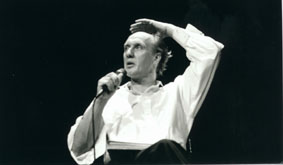William B. Collins schreef 4 december in de Philadelphia Inquirer
Van Veen: A clever show that mixes music, mime
Saturday. Dec. 4. 1982
The balding Dutchman who commandeered the stage of the Shubert
Theater last night is something else
in show business. A kinetic philosophe,. perhaps. He sings his own
songs and those of other people we
haven't heard of either. He dances,
hitchhikes, plays the violin nicely
and the piano madly and,. just before
intermission, he b1ows up the world.
 Herman van Veen is passing
through town on the way to his
Broadway debut in what his producers can only helplessly
call "a muscal show" on the program, although
Herman van Veen: All of Him is that
and a couple of other things. He is
doing two performances here, the
second one this evening.
Herman van Veen is passing
through town on the way to his
Broadway debut in what his producers can only helplessly
call "a muscal show" on the program, although
Herman van Veen: All of Him is that
and a couple of other things. He is
doing two performances here, the
second one this evening.
With three backup musicians, an
awesomely tricky sound system and
staging that favors stark, stabbing
light effects, van Veen navigates his
way through the landscape of contemporary life in full awareness that
it is a mine field for the human
spirit.
There is a song about a girl who
comes home from the drug clinic to
an indifferent family, and another
one about cowards who "live because
they're clever" and heroes who "die
and live forever.-" There is even an
Ode to Suicide in which a suicide.
prone man's conscience keeps him
alive to die a natural death.
That's entertainment? Well, no,
not in the variety-show sense. People
who want to check out this fellow -
and he is eminently worth checking
out - should proceed with the understanding that he is in the poetry
business and is utterly serious about
what is happening to us as we mill
around looking for something to
take our minds off it.
Van Veen is also a skillful mime.
Attired informally in white, he creates images that are flashes
of insight, rather like the guy who draws
those disturbing cartoons on the editorial page.
Unemployment? Van Veen walks
straight toward the source of light.
introducing himself and saying he is
looking for work, and the light goes
out. He turns and repeats himself
and another light is extinguished.
And so on, until the last light goes
out before he has a chance to say
anything.
Nuclear suicide? Yes, the simulated big boom feels strong enough to
blow every fuse in the place. It sends
the man scampering up and over a
cyclone fence, behind which he
finds himself a prisoner. The image
defies logic, as poetry so often does,
but it is gripping.
In the first act, after a while, I
began to feel weighed down by the
gloom. Van Veen has an overload
problem, which could probably be
worked out with more judicious rearrangement. It is too much of a
relief when he turns to lighter, more
antic material, like the virtuoso bit
with the piano in which he plays a
piece of music composed for every
sound that can be made on or with a
piano both as a musical instrument
and a piece of furniture.
Given the generally thoughtful aspect of the show, van Veen's sudden
spastic switch to rock parody comes
as a shock, but it is good and it is
funny.
The concept and the continuity are
the product of a collaboration
between van Veen and his director,
Michel Lafaille. Rob Munnik is the
hotshot lighting designer. That great
sound system was put together by
Hans van der Linden. Erik van der
Wurff (keyboard) is the music director,
with whom van Veen wrote several of the songs.
By William B. Collins
1nquirer Theater Critic
terug naar de index
 Herman van Veen is passing
through town on the way to his
Broadway debut in what his producers can only helplessly
call "a muscal show" on the program, although
Herman van Veen: All of Him is that
and a couple of other things. He is
doing two performances here, the
second one this evening.
Herman van Veen is passing
through town on the way to his
Broadway debut in what his producers can only helplessly
call "a muscal show" on the program, although
Herman van Veen: All of Him is that
and a couple of other things. He is
doing two performances here, the
second one this evening.